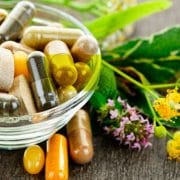5 Steps to Reprogram Your Genes
 There are fixed, heritable genes (such as skin and eye colour) and there are genes that can be influenced daily according to our lifestyle. These genes are continually directing the production of proteins that control how your body functions at every second of the day. Genes turn on or off (sometimes at a rapid rate) only in response to signals they receive from the surrounding environment – signals that you provide based on the food you eat, the exercise you do (or don’t do!), your quality of sleep, sun exposure and so on. Genes are like light switches that turn on and off and influence every element of body function. So, you are in the driver’s seat to take control of your genes expression. Here are some tips for you:
There are fixed, heritable genes (such as skin and eye colour) and there are genes that can be influenced daily according to our lifestyle. These genes are continually directing the production of proteins that control how your body functions at every second of the day. Genes turn on or off (sometimes at a rapid rate) only in response to signals they receive from the surrounding environment – signals that you provide based on the food you eat, the exercise you do (or don’t do!), your quality of sleep, sun exposure and so on. Genes are like light switches that turn on and off and influence every element of body function. So, you are in the driver’s seat to take control of your genes expression. Here are some tips for you:
- Awareness Start thinking about your everyday lifestyle and how your genes may be responding to it. Each day your genes will respond positively or negatively depending on how you are living your life.
- Exercise – The activity level of skeletal muscle modulates a range of genes that produce dramatic molecular changes, and keep us healthy (Neufer & Booth, 2005). Even one single vigorous workout can set off a chain reaction of health benefits through activation of key genes. Exercise can suppress the expression of genes that contribute to chronic diseases, whilst up-regulating healthy gene expression almost immediately. So, next time you’re sweating it out in a workout, know you are having a positive effect on your genes. It may be the motivation you need to go that extra mile!
- Nutrition Studies have shown that different intakes of food can affect your gene expression through a process called methylation. Methylation reactions are critical for many bodily functions and need significant amounts of methyl groups from food to function optimally. We have known for many years that certain foods which are high in B vitamins help with methylation, such as cooked vegetables (especially green vegetables & beets), unprocessed meats and quinoa – but we also need other foods to make up a healthy, balanced diet.
CARBOHYDRATE AND GENE EXPRESSION
Recent research from the University of Science and Technology in Norway has shed light on the gene, expressing effects of certain types of diet. “We have found that a diet with 65% carbohydrates, which often is what the average Norwegian eats in some meals, causes a number of classes of genes to work overtime,” says Berit Johansen, a professor of biology at NTNU.
This has significant implications for people who follow recommended dietary guidelines and eat a diet that has 55-65% calories from carbohydrate.
“Genes that are involved in type 2 diabetes, cardiovascular disease, Alzheimer’s disease and some forms of cancer respond to diet, and are up-regulated, or activated, by a carbohydrate-rich diet,” says Johansen.
The researchers concluded that both high and very low carbohydrate diets were wrong, but carbs should be capped at 40% calories. “A healthy diet shouldn’t be made up of more than one-third carbohydrates (up to 40 percent of calories) in each meal, otherwise we stimulate our genes to initiate the activity that creates inflammation in the body.”
WHAT SHOULD YOU DO?
The Ritualize 80/20 food pyramid will give you a great balanced diet that is lower in carbohydrate and higher in fat and protein than traditional government guidelines. Eat plenty of fresh, locally grown vegetables and a moderate amount of fruit, as well as grass fed, free range meat and chicken, sustainable fish, legumes, nuts and seeds and drink plenty of water. Most of your fat should come from extra virgin olive oil and avocado, with moderate amounts of coconut oil, dairy and other animal fats as well as minimal amounts of processed fats and commercial vegetable oils. The big key is to avoid processed foods and eat mostly stuff that has been alive. Home cooking is always the best, but for the time poor, there are more and healthier choices in supermarkets and grocery shops for a quick, easy meal.
- Stress – we have known for many years that chronic stress can have detrimental effects on your health, and we now know the biochemical pathways behind such negative effects. Even negative thoughts can stimulate the production of genes that increase our chances of chronic disease, but we need to understand the ‘Goldilocks effect’ of stress – we need a certain amount of stress to stimulate us and help us to adapt. This process is known as ‘hormesis’ and enables us to develop stress resistance. Just like an athlete can either under-train or over-train, we can get too little or too much stress. Athletes optimise their training by paying close attention to volume, intensity and duration, and so should we. During a period of prolonged and more intense stress, our recovery needs to be optimal – just like an athlete.
- Psychosocial – a number of other areas are emerging that can affect gene expression. We know that being socially isolated or rejected can up-regulate genes involved in dangerous metabolic inflammation, but being socially connected can have a positive effect on our wellbeing. Meditation has recently been found to suppress inflammatory genes and can even increase grey matter density and the practice of gratitude can enhance your mood and wellbeing. Doing a daily gratitude ritual, practising a few 1-minute meditations throughout the day and taking time to connect socially will pay huge dividends over time.
The bottom line is that a range of interacting lifestyle behaviours affects our gene expression and our overall health. Eating well will give you the energy to exercise and exercising regularly will help you to manage stress and enhance your focus, as will regular 1-minute meditations and a daily gratitude ritual. This will put you in the right frame of mind to cultivate social relationships, which will make you more positive – a very positive lifestyle loop!



 The marketing of antioxidant supplements
The marketing of antioxidant supplements
 In my last post, I wrote about the fact that the marketing and hype around taking
In my last post, I wrote about the fact that the marketing and hype around taking